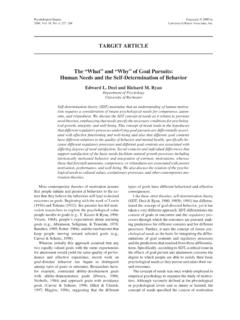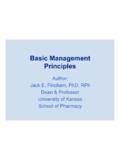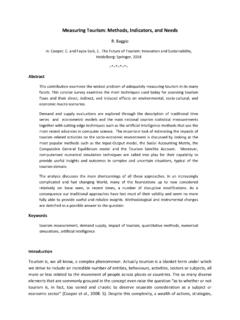Transcription of Achievement of Abraham Maslow’s Needs Hierarchy Theory ...
1 Journal of Curriculum and Teaching Vol. 2, No. 1; 2013 Published by Sciedu Press 140 ISSN 1927-2677 E-ISSN 1927-2685 Achievement of Abraham Maslow s Needs Hierarchy Theory among Teachers: Implications for Human Resource Management in The Secondary School System in Rivers State Adiele & Abraham , Nath. 1 Ignatius Ajuru University of Education, Port Harcourt, Rivers State, Nigeria 2 Department of Educational Management, Faculty of Education, University of Port Harcourt, Port Harcourt, Rivers State, Nigeria *Corresponding author: Department of Educational Management, Faculty of Education, University of Port Harcourt, Rivers State, Nigeria E-mail: Received: November 24, 2012 Accepted: December 5, 2012 Online Published: May 18, 2013 URL.
2 Abstract The study investigated the Achievement of Abraham Maslow s need Hierarchy Theory among secondary school teachers in Rivers State. A 25-item questionnaire was designed, validated and administered on a sample of 500 teachers drawn from 245 secondary schools in Rivers State. The result revealed that secondary school teachers indicated insignificant level Achievement of lower and higher order Needs of Abraham Maslow s need Theory which reflected in their low level of Achievement of hunger, shelter, security, belongingness, friendship and affection Needs ; as well as poor Achievement of self respect, recognition, self actualization and potential self development.
3 The effect of this on teacher motivation is the declining quality of teaching and learning, and unethical practices to make ends meet among teachers. It is recommended that teachers remunerations be kept at par with those of their counterparts in other professions. Above all, government must muster the will power to upgrade existing facilities and work conditions in the secondary school system; this will engender greater commitment and productivity of teachers. Keywords: Achievement ; Abraham Maslow; Needs Hierarchy Theory ; secondary school system, human resource management, teachers, Rivers State 1.
4 Background to the Study Motivation is defined as the forces, drives, Needs , tension states, or other mechanisms that starts and maintain voluntary activity towards the Achievement of personal goals (Hoy & Miskel, 1987:176). Motivation is geared towards increasing people s efforts and performance. That is why Bateman and Snell (1999:440) see it as a force that energizes, directs and sustains a person s effort towards the Achievement of goals . Individual motives are usually based on Needs , thus, there are Needs that give rise to wants which cause tension. These in turn give rise to actions, which result in satisfaction .
5 Motivation therefore is the direct result of Needs , desires and expectations which energies behavior. If there is a deficiency in what the individual wants, expects or anticipates, tension is created, the individual then adopts certain behavior that will lead not just to the reduction of tension, but also to the Achievement of the expected desires. The secondary school teacher just like any other worker has his individual motives based on Needs , desires and expectations which energies his behavior towards the Achievement of goals. The primary task of the school administrator therefore is to ensure that the school teacher functions effectively and efficiently so as to achieve results.
6 To achieve this task, it is the duty of the school manager to be able to know what motivates the teacher. Motivation is a central construct in school administration. The school exists primarily for teaching and learning, and so, anything that will enhance teaching and learning should be of paramount importance to the school manager/administrator ( Abraham , 2003). Journal of Curriculum and Teaching Vol. 2, No. 1; 2013 Published by Sciedu Press 141 ISSN 1927-2677 E-ISSN 1927-2685 Some schools of thought have written about theories of human motivation as a tool for effective administration.
7 Evidence is drawn from the works of Abraham Maslow (1974); Alderfer (1960. 1970), Herzberg, Fritz Heider; Skinner (1960), Adams (1965), and Douglas McGregor (160). These scholars are all in agreement that motivation is a sine-qua-non to organizational goal attainment, and that, the level of organizational effectiveness is largely dependent on the level of motivation of its workforce. In Rivers State of Nigeria, a lot has been done in terms of educational infrastructural development. But not much is known about the level of preparedness of the workforce in the area of quality delivery of education. The aggressive infrastructural development in education in Rivers State has triggered off concern for investigation into the level of motivation of teachers towards the Achievement of quality education in the state.
8 This concern has become more critical for a country that is characterized with long history of under-funding of education and incessant strikes by its education workforce. Indeed, the dwindling quality of education witnessed in Nigeria in the last 30 years, can largely be traced to work conditions, which many scholars have affirmed contributed significantly to low morale and poor job satisfaction that is predominant among the teaching workforce. Teachers in the secondary schools are the life-wire of the secondary school system. Whereas it is an undisputable statement that no education system may rise above the quality of its teachers (FRAN 2004), it is equally undisputable that not much can be achieved in terms of school goals attainment if the morale of teachers are low.
9 This is true because even teachers with the highest qualifications still need to be motivated to achieve result. Psychologists agree that the highest need of human being is that of Achievement or self actualization which encompasses not only the ability to accomplish, but the need for actual Achievement of something in life, and, the job remains the major source of satisfaction of this need (Fippo 1982). Scholars are also in agreement that the most important factor in teacher motivation is better pay, and good conditions of service Edem (1987:60) had noted that the morale of teachers are likely to fall if there are noticeable disparities between their conditions of service and those of others.
10 For teachers to be effective in their job, they must be assured of good pay packet, adequate provision for advancement, promotions and other benefits enjoyed by people in other professions. 2. Statement of Problem In the last 20 years or more, the quality of secondary education has continued to deteriorate, largely because of the quality of instructional delivery. In some instances, the products of the system are found not able to spell three latter words, and correctly place their tenses. The popular view is that the poor learning outcome is associated with the quality of teachers in the system.















